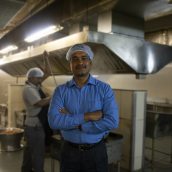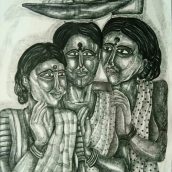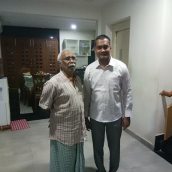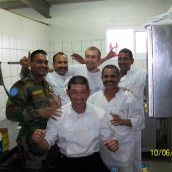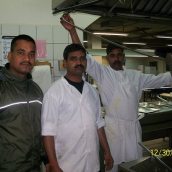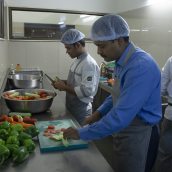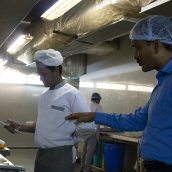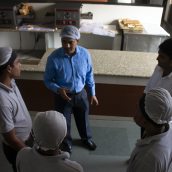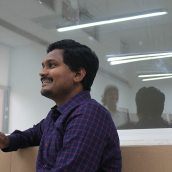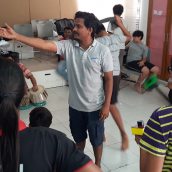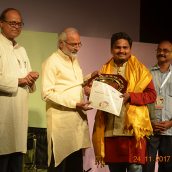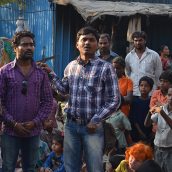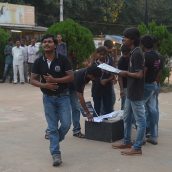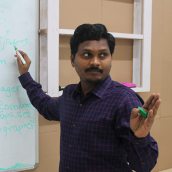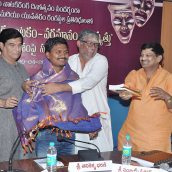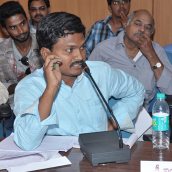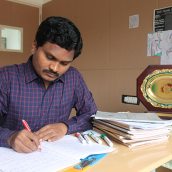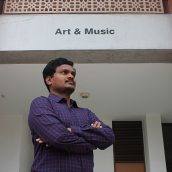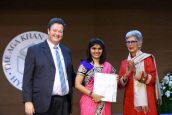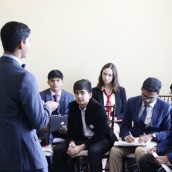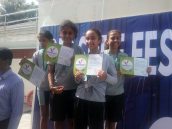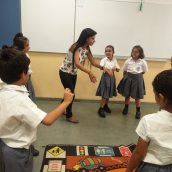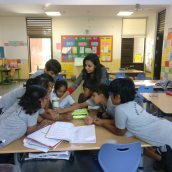Dhan Prasad - the Academy's own renaissance man
Dhan Prasad was born in Hyderabad after his parents relocated here from Nepal, and grew up in Red Hills. He joined the Institute of Hotel Management and Catering Technology, completing their Food Production & Patisserie course in the year 1993. In the following years, Dhan Prasad trained and worked at two of the premiere hotels in India, the ITC Grand Chola in Chennai and Oberoi Krishna in Hyderabad (renamed Taj Krishna). It was during this stint in Hyderabad that Dhan Prasad decided to pursue his passion for the arts. “You can call it my first love,” he says.
As a school boy, Dhan Prasad often visited the Jawahar Bal Bhavan in Nampally. The Bal Bhavan, with its high ceilings, yellow walls and large play area was created to be a place where children could hone their talents in the arts, learning music, dance, and, of course, drawing and painting. Here, he trained under artist and National Film Award winner, Thota Vaikuntam, whom he describes as his role model, guru and inspiration. “He used to encourage me by giving me big drawing charts and colours.” Dhan Prasad re-entered university in 1995, this time as a fine arts student at the Jawaharlal Nehru Architecture and Fine Arts University. His art, mainly sketches and acrylic, portray scenes of men and women, often at work, and always in conversation. The paintings are on large canvases, and though they have some of the stylistic attributes of Madhubani art, they are strikingly unique. The Bal Bhavan he went to is still active today and caters to around 3000 children in spite of being under-funded, and sharing its space with a local fire department.
“It was very tough to manage my work and my painting,” he says. Dhan Prasad was juggling university work and his job at the Krishna simultaneously at this time. As the pressure mounted, he was informed that he had been chosen to be Junior Commissioned Officer (JCO) of catering in the Indian Army, a proposition that comes from the desk of the President of India. Dhan Prasad describes joining the army as a bold decision. He remembers thinking, “I cannot ignore this opportunity to serve my country.” So he, in his words, left his white chef’s robes and donned the olive green of the Indian army.
Glad to have the opportunity to serve his country with his culinary abilities, he worked in the army for 19 years, serving in its storeyed institutions across the country and even abroad. Dhan Prasad was among the forces sent from India to be a part of the UN’s mission to maintain ceasefire between Syria and Israel. “My most memorable days were as kitchen manager of an international kitchen at UNDOF (United Nations Disengagement Observer Force), Israel,” he shares. “My most challenging work was at IMA (Indian Military Academy), Dehradun and OTA (Officers Training Academy), Chennai.” In these kitchens, Dhan Prasad organised meals and hospitality services for 2000-2500 people every day. Standing in charge of these large operations gave Dhan Prasad an understanding of the workplace, responsibilities and leadership, which make him revered by those who work under and alongside him.
“Being an army man he brings discipline to our catering,” says Head of Operations at AKA Hyderabad, David Roy. “He’s always on the dot.” Dhan Prasad and David work very closely, and often under high pressure. “In three years, we have never missed catering at a single event, and this is because of our excellent kitchen, its staff, and of course, Dhan Prasad.” It is a great compliment to him that in spite of the demanding nature of their job, Dhan Prasad has created an atmosphere of conviviality in the kitchens and among his support staff. “He understands his job, his responsibilities,” says David. “But the problem with him is that he doesn’t say no to anyone!”
The demands of the Academy’s kitchen are different from those of a military kitchen, and Dhan Prasad relishes the challenges that come with this job. “The diversity [in the students, faculty] gives me an opportunity to challenge myself and be innovative and creative in our day to day catering services,” he says. Dhan Prasad also looks forward to the holy month of Ramzan and being able provide for fasting students at the early hours of dawn. “The Global Encounters holiday camps offer other opportunities to test our calibre,” he adds.
Working at a school, Dhan Prasad believes learning about the mammoth effort that goes into their meals could be beneficial to students’ education. “Students need to have responsibility toward their food." He wants students to be informed about the processes of the food & beverage industry and also about etiquette. “Our students are future ladies and gentlemen who will go out internationally and later become responsible citizens of the nation. Table manners count for a lot when it comes to the personality of an individual.”
At 17, Dhan Prasad knew he wanted to be in hospitality. Today, he is a chef, an artist, and a retired Subedar Major. The praise heaped on him is the kind that Swiss watchmakers pine for. He is efficient, dependable and yet creative. “Art is long and life is short,” he muses. “Cooking is an art and science, it never ends and we can’t master it. The only thing we can do is try, practice and keep doing good work.”
Written by Ajay Sundaram
Chandrasekhar Indla - Holding the baton of Telugu theatre
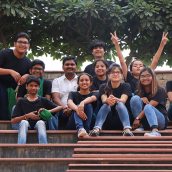 All the world's a stage, Shakespeare famously wrote, and all the men and women merely players. Chandrasekhar Indla, drama faculty at the Academy’s theatre arts department, would take a dim view of such a simplistic description of a stage play. As director, lighting designer, sound technician, mask-maker and writer, Chandra has been a part of hundreds of performances and, talking to him, you would believe that the stage is possibly more than the world, and players perhaps more than merely men and women. “Drama is an important instrument that can build a sense of consciousness in society,” he shares. “There is a need to save and reinvent drama.” For over five years now, he has dedicated his career to introducing children to the world of theatre arts.
All the world's a stage, Shakespeare famously wrote, and all the men and women merely players. Chandrasekhar Indla, drama faculty at the Academy’s theatre arts department, would take a dim view of such a simplistic description of a stage play. As director, lighting designer, sound technician, mask-maker and writer, Chandra has been a part of hundreds of performances and, talking to him, you would believe that the stage is possibly more than the world, and players perhaps more than merely men and women. “Drama is an important instrument that can build a sense of consciousness in society,” he shares. “There is a need to save and reinvent drama.” For over five years now, he has dedicated his career to introducing children to the world of theatre arts.
A prolific academic, Chandra was among highest scorers in the National Eligibility Test, an exam held nationwide by the University Grants Commission (UGC) which qualifies people to teach performing arts at a collegiate level. His work since his first tenure as a master’s student at the University of Hyderabad has been about introducing drama to a young audience. He was among the first members of the university’s Theatre Outreach Unit, created to expose children all over the state to theatre arts. He joined the Aga Khan Academy Hyderabad in 2015 to continue in this effort. “Our Academy is one of the best places where the teacher-student relationship is so strong in terms of respecting each other and sharing thoughts,” he says. Chandra, not a technical direcor for drama at the Academy, was very happy to teach at the Academy because the IB curriculum gives theatre arts the importance of a elective, rather than just tacking it on as a co-curricular activity as other school programmes do.
With two master’s degrees and a PhD on the way, Chandra surprisingly admits he wasn’t very good at school. In fact, he even struggled through his first degree, a bachelor’s in computer science. “I don’t remember any programming today,” he confides. Once Chandra relieved himself of his pursuits in technology and began honing in on theatre, his academic performance drastically improved. He finished his master’s in performing arts with a gold medal from the University of Hyderabad, and went on to earn two prestigious research fellowships from the UGC to write about theatre arts. These fellowships sustained him for nearly six years. “My family was happy to find out I was going to pursue theatre arts, because my paternal uncle is an author, and they thought he could help me.”
Chandra was born in Kanduluru in Andhra’s Prakasam district where his parents worked for daily wages, often at construction sites or in the tobacco fields of of the coastal district. “He was into old, traditional theatre arts,” Chandra says of his uncle. “Today I’m in national theatre festivals. I have more contacts than him,” he adds, laughing. Indeed, Chandrasekhar Indla has become a recognisable name in Telugu literary circles. This began when his final master’s project, a play adaptation of the book Gopathrudu by K.N.Y Pathanjali, became a sensation in theatres across Andhra Pradesh (before the creation of Telangana State). He followed this with another adapted play called Miss Meena, based on the tragicomedy The Visit by Friedrich Dürrenmatt. Ms. Meena was performed over a 100 times statewide, earning Chandra a reputation as tested thespian. Apart from this, Chandra has also spoken and presented about Telugu theatre at international conferences.
“As a professional admirer of drama I would like to hand over the future of drama to the students to take it further,” he says. Since his joining the Academy, our students have held performances across the city, attended several festivals and plays, and most notably, entered the Amaravathi National Theatre Festival in 2017. “I had the freedom to run and develop the department,” he says of being the first drama teacher at the school. “I have used this freedom to develop the students’ abilities in acting, communication, confidence, creativity and thinking skills.” With the addition of George Macpherson to the drama department as of August 2018, the programme has only gained in strength. “We’ve built a whole new teaching strategy together,” Chandra says of his friend and colleague George. “As a practioner, I'm more comfortable teaching the the practical aspects of theatre, whereas George is very good at teaching theory."
Inevitably, Chandra went from adapting literature to the stage to creating literature himself. As of date, he has been published in Telugu literary magazines 12 times, and has a collection of short stories on the way. One of the major motifs in Chandra’s writing is social equality and social reform. At the Aga Khan Academy Hyderabad, where pluralism is one of the tenets of the school’s ethos, Chandra is a person students can look up to who shows these values in his work and personal life. Chandra met his wife Ezhilmathi in 2009 when they were doing their master’s of philosophy in performing arts at Pondicherry University. His area of focus was drama while hers was music. “She taught me Tamil,” he says, “I think that’s where it began.” The two had to convince their parents before they could get married. “My marriage is inter-state, inter-faith, inter-caste,” he laughs. In August 2012, Chandrasekhar and Ezhilmathi were married in a wedding with both Hindu and Christian rituals.
“Drama can build self-confidence in a person. However, most people do not have proper understanding or admiration of drama,” Chandra says. Looking out of his office window at an overcast December morning, Chandra’s thoughts about his art turn bleak. “No one reads scripts,” he says of the culture of literature in the subcontinent. “People will just read Shakespeare as a play, but that is not the case for Telugu literature.” The shields and trophies on his desk gleam in the wintry light. “Maybe this culture of drama will die out one day."
Though the thought is dark, Chandra doesn’t let it get in the way of his work, and rather uses it to fuel his work as a teacher. He knows that many of his students will go on to pursue, say, computer science, but that doesn’t deter him. “I want my students to be good humans who are not only responsible but also sensitive to others’ emotions and culture. Drama needs to be handled more as a legacy and its nuances need to be inherited and passed on generation after generation. This is possible only when I take up the role of a teacher.”
Written by Ajay Sundaram
Capturing journeys in frames
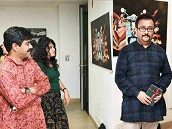
Cities and stories
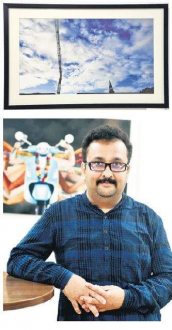
For gender equality in sports
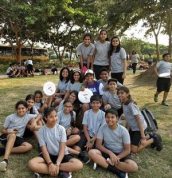
The year diversity defined our strength

Anjum Budhwani - living her dream
Anjum has been teaching since the time she was an undergraduate student. She began as a volunteer at her community Religious Education Centre as part of the Institute for Ismaili studies’ Ta’lim programme, a course designed to introduce children to the faith, ethics, history and cultures of Muslim peoples and of the Ismaili community in particular. “Compassion builds a strong relationship between teacher and student,” she says. “If a teacher is caring and loving the student feels safe with her, and learning will happen successfully in turn.”
Anjum received her first bachelor’s degree in commerce from Hyderabad’s Osmania University, and went on to collect another bachelor’s in education followed by a master’s degree when she decided to become a teacher. Her aspiration was to join the Aga Khan Academy Hyderabad, and she realized this dream in 2012. “I feel elated when I hear people saying ‘She works at the Aga Khan Academy Hyderabad.' ” It was also her mother’s dream to see her daughter become a teacher.
Though she says every day at the Academy is special, some days have been more special than others. “I cherish the day when His Highness the Aga Khan was here on 15th April 2015,” beams Anjum, remembering some his words to our teachers. “He mentioned that there will be difficult times while you are teaching and learning and you will have failures during your journey of teaching. But remember the result and keep the goal in your mind that we are working towards creating future leaders and that it’s not going to be easy.” These words are a part of what inspire Anjum to teach at the Academy and to better herself as a facilitator to young students.
One of her favourite things about teaching at the AKA Hyderabad is discussing teaching practices with her colleagues. Anjum has imbibed the philosophy of being a lifelong learner; learning from her colleagues, she explains, has been key to her growth as a teacher. “We have regular and ongoing professional development, which has provided me with a lot of opportunities to improve myself,” shares Anjum. “Sharing best practices, professional development reading, action research and other platforms where we get to learn from each other gives us the chance to reflect on our learning and teaching process.”
These collaborative efforts have helped Anjum grow into the ideal PYP teacher who believes in giving her students voice, choice and ownership in their school work. “I design assessments and learning engagements with students in order to provide them with ownership and accountability in their learning.” Miss Anjum’s classroom is decorated with student input, with students also influencing their seating arrangement. In her class you will see the Innovation Corner, where students create new things from recycled material. Students of 3K have a duty list, where students are given charge of classroom resources like books and stationery. Giving students responsibility and ownership of their space this way helps allows them an early understanding of stewardship.
“She endeavors to exemplify stewardship through her actions,” says Academy Junior School Principal, Sreelatha Kumar. “Equanimity and her unquestionable commitment are her best qualities." Sreelatha adds that it is remarkable how Anjum deals with adults and children with the same grace and evenness.
It is very common that parents visiting the Aga Khan Academy Hyderabad Junior School, upon seeing students in the sand pit or in the art room, wish that they could have done their primary education here. Should they peep into Miss Anjum’s grade 3 classroom, they will understand that it is teachers like her whom they missed having in school, because they are the ones who help create the idyllic aura of a primary school.
Written by Ajay Sundaram
